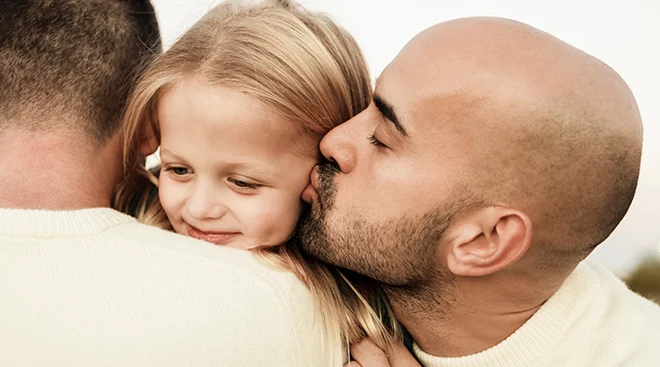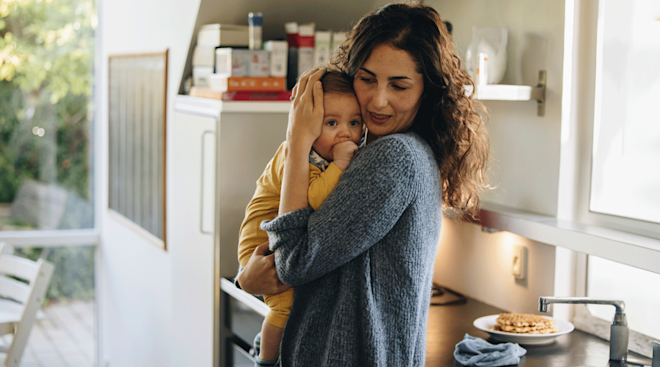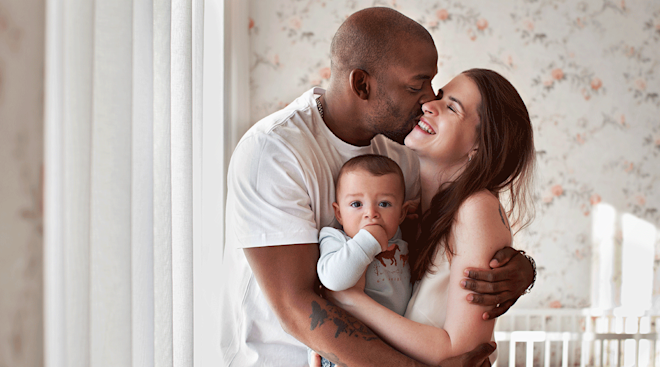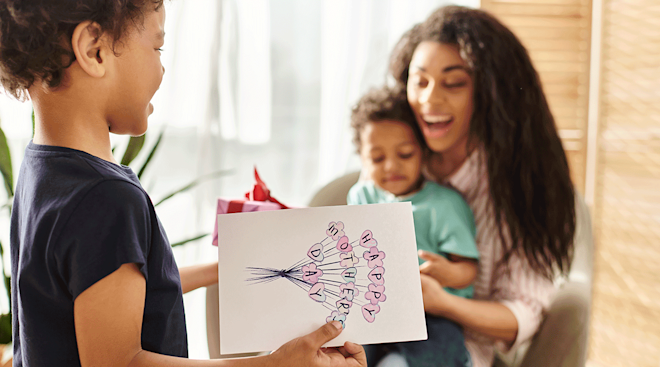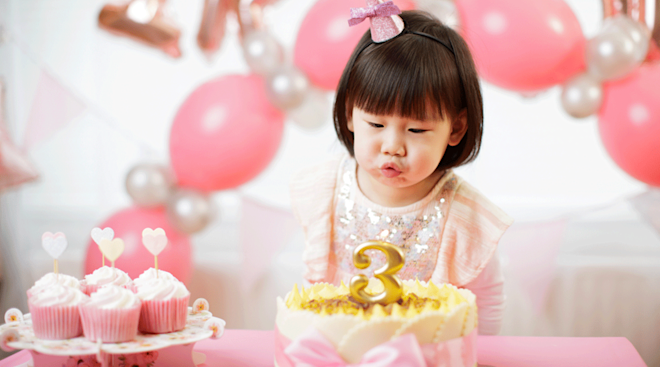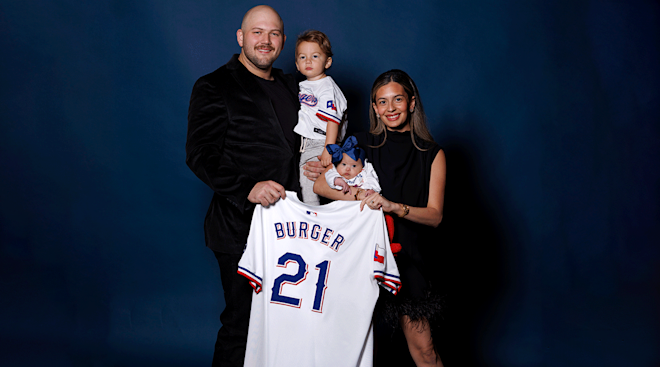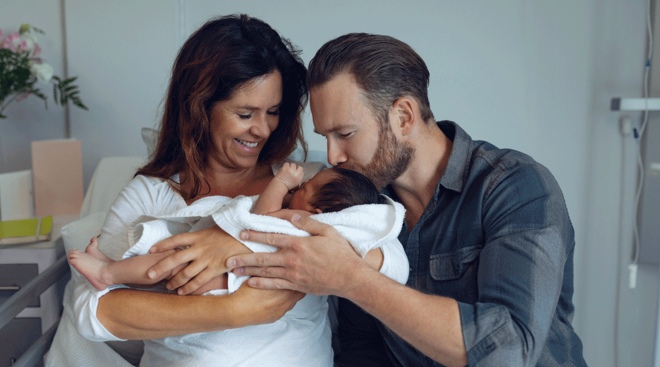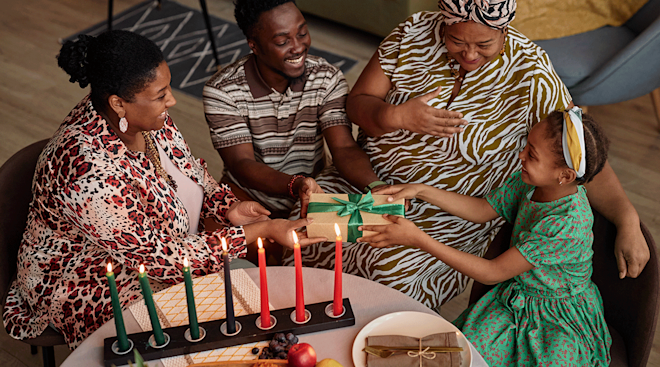A Mental Health Guide for LGBTQ+ Parents
Raising a child is hard enough on its own. But it can be even more challenging for LGBTQ+ parents who may face bias, stigma and outside stress along the way. Fortunately, having the right support in place can help if and when issues arise. Whether you’re just now pondering the possibility of parenthood or in the throes of it, here’s expert intel on how to maintain your mental health through the trials, tribulations and triumphs that come with the territory.
Regardless of your family makeup, parenting comes with its fair share of hearty challenges. Helping to shape little humans is a stressful gig to say the least, and strong emotions will surface from time to time. And while mental health should be prioritized for all parents, it may be especially important for those in the LGBTQ+ community for a number of reasons.
According to the National Alliance on Mental Illness, those in the LGBTQ+ community are more than twice as likely to experience a mental health condition than their cis-gender counterparts. This risk is even more elevated for the trans population. Of course, a number of social factors contribute to this statistic, including discrimination, denial of civil and human rights and experiencing rejection from loved ones. What’s more, while research is limited, one study found that lesbian parents are at an increased risk of experiencing postpartum depression and other perinatal mood disorders. A lack of support and facing bias during pregnancy and childbirth can further compound this issue.
Below, some additional factors that can take a toll on your mental health and well-being as you embrace your role as a parent.
Questioning your identity
A baby changes everything. It’s normal to reevaluate your identity and place in the world when you’re suddenly responsible for another human being. And this can potentially be triggering. “It’s almost like the coming out process all over again but on a much different level,” says Jonathan Wavres, MHC, a mental health counselor at the Family Counseling Center in Gloversville, New York. Self-reflection and growth are normal as you’re transitioning into this new life role, but it can also open old wounds during a very vulnerable time.
Stigma and prejudice
Judgment from outsiders comes with the territory of parenting. But when you’re an LGBTQ+ mom or dad, it’s more than people simply critiquing your stroller selection or feeding schedule. Wavres explains that the “age-old stereotype of gay parents turning or making their own child gay” weighs heavily, as does the public misconception that having gay parents will in some ways negatively impact a child’s emotional and social development. Baseless as these notions may be (and, for the record, many studies have shown that kids of gay parents fare just as well as children of heterosexual parents), it’s hard to shake the stigma that comes with your family not being characterized by the traditional ‘one mom, one dad’ dynamic. “Backlash and closed-minded people will always be here, and your child is going to notice and ask questions,” says Wavres. This is why it’s so important to maintain open, honest and age-appropriate communication with your child from the get go. It won’t be easy, but you want to make sure that you’re both emotionally equipped to handle any outside backlash.
Feeling a lack of representation
As a reproductive endocrinologist that works with many LGBTQ+ individuals and couples starting their parenthood journey, Laura Meyer, MD, says she hears a lot about a “lack of representation of the [LGBTQ+] parenthood experience.” This is true on a community level, in childbirth education classes and in new-parent support groups. Furthermore, a lack of inclusivity in the media adds further insult to injury. Meyer explains that this leaves many new or soon-to-be parents feeling “isolated due to not being able to find welcoming spaces or groups” as they prepare for and transition into parenthood.
Intrusive questions
The fact is, people are nosy, and you may at some point face “intrusive questions,” says Meyer. These might be about sperm or egg donation, a gestational carrier, adoption or other factors that have made your entrance into parenthood seemingly “different.” You’ll have your narrative prepared should inappropriate and unwarranted questions or comments arise, but that doesn’t mean it won’t still hurt if and when they do. That said, you can use these opportunities to educate others and advocate for yourself and the LGBTQ+ community.
Bumps along the road are par for the course. But you can minimize their emotional impact by keeping your mental health strong—and that starts with taking some proactive steps.
Prepare as a prospective parent
Thinking about starting a family? Prospective LGBTQ+ parents have many different paths and options to consider. Some are more stressful and trying than others. “For those who choose biological family-building through fertility treatment, it can be an intense process, both physically and emotionally,” says Meyer. “It’s important to remember that there will be ups and downs on each path to parenthood, and that taking time for self-care is essential.” She encourages that you do your due diligence and seek out as much information as possible about your different options, and connect with others in the LGBTQ+ community who’ve gone through a similar journey.
Know where to turn for information
Knowledge is power. Meyer and Wavres recommend finding support and community both online and in real life. Some websites to check out include Gays With Kids, Gay Parents To Be and Men Having Babies. PFLAG National and Rainbow Families both offer lots of information and resources, and The Family Equality Council has an online listing with a national network of LGBTQ+ family groups to connect with. “Many of my patients have found it particularly helpful to connect with other LGBTQ+ families to share experiences, build community and participate in advocacy efforts,” Meyer says.
Remind yourself that you’re worthy
Positive self-talk, mantras, affirmations—whatever you call them, they can help restore your confidence and remind you that you’re worthy as a parent and a person. “Sometimes a little vanity isn’t necessarily a bad thing,” says Wavres. “Own your parenting skills. Don’t let negative self-talk influence you; the world has given irrational negativity to the LGBTQ+ [community]. Just like the feeling when you fully accepted yourself, you already /[know] your strengths.”
Seek outside help
Everyone can benefit from an impartial listener. “Seek therapeutic services—perhaps individual or group [therapy]. Sometimes we cannot do it by ourselves (and we shouldn’t have too),” says Wavres. “Therapy is a sign of immense strength and is a huge positive… We need an outside person who is not biased to provide an outlook that we haven’t heard that may be eye-opening and healing.”
That said, you’ll probably want to do your research to find a therapist that has experience working with LGBTQ+ patients—and one that is affirming of your specific experience as a parent and human. Don’t be intimated to ask questions and vet a prospective therapist, psychologist or counselor. Not all therapy is created equal, and you want to find someone you can trust and openly share your thoughts and feelings with.
Prioritize self-care
A unifying truth for all parents: you can’t pour from an empty cup. That’s why it’s important to take care of yourself if and when you feel your mental health slipping. Acknowledge and honor what you’ve been through, and show yourself grace and kindness. “Practice self-care in the moment, utilize a coping skill, do a positive activity and remind yourself of your strengths,” advises Wavres. You have to take good care of yourself in order to be a better parent for your child.
Don’t let outside negativity in
Communication is key to maintaining your mental health and staying on top of issues before they become problems. Talk to your partner, talk to trusted friends and loved ones, talk to others who’ve walked in your shoes—or, at least, a similar pair. Outside negativity will always exist, so Wavres says it’s important to “rely on your partner and the voices you want to hear. Surround yourself with kindness and positivity.”
Laura Meyer, MD, is an ob-gyn and reproductive endocrinologist at Illume Fertility in Norwalk, Connecticut. She received her medical degree from the NYU School of Medicine, and completed both her residency and fellowship at New York Presbyterian Hospital-Weill Cornell Medical Center.
Jonathan Wavres, MHC, is a mental health counselor at the Family Counseling Center in Gloversville, New York.
Please note: The Bump and the materials and information it contains are not intended to, and do not constitute, medical or other health advice or diagnosis and should not be used as such. You should always consult with a qualified physician or health professional about your specific circumstances.
Plus, more from The Bump:
Navigate forward to interact with the calendar and select a date. Press the question mark key to get the keyboard shortcuts for changing dates.

































